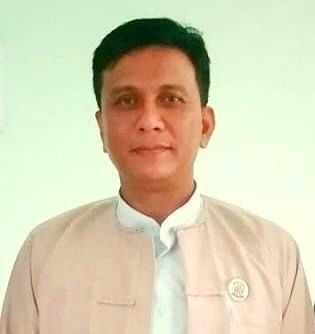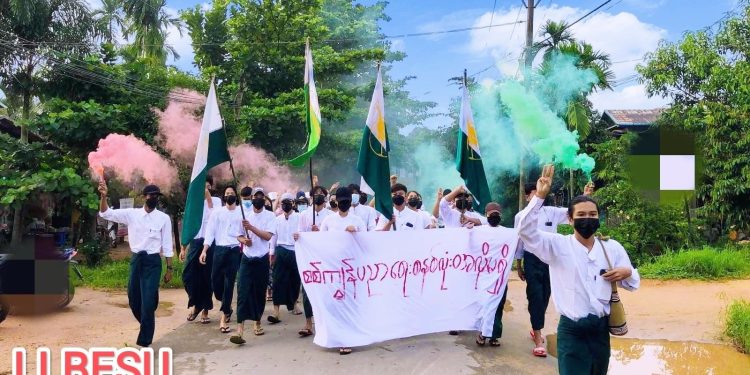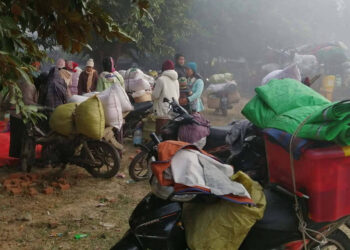The military coup of 2021 did more than just destroy Myanmar’s political system. The damage it has wrought extends to every sector, not least the education system. The sector has suffered dire consequences, with 80 percent of Myanmar’s nearly 10 million students rejecting the regime’s education system, according to the Education Ministry of the parallel National Unity Government (NUG).
The takeover came as a particularly devastating blow for one group: Students who passed the matriculation exam in 2020 and refused to study under the regime’s education system lost their opportunity to continue their education. For the striking students, Myanmar Nway-Oo University, a public university, was established in October 2022 under the guidelines of the NUG to provide undergraduate and postgraduate courses as well as vocational courses for striking students. It has an affiliation with Interim University Councils (IUCs), which were founded by striking students and teachers across the country.
Dr. Sai Khaing Myo Tun, the NUG’s deputy minister of education, talked to The Irrawaddy about the shadow government’s plans to meet the education needs of Myanmar’s striking students. He also delineated the promising future of a new education system under a federal democracy and other education policies that will benefit Civil Disobedience Movement (CDM) students, resistance forces and disabled persons after the revolution.
What are the Ministry of Education (MOE)’s priorities for filling the education gap for striking students?
We implemented the online education system as the first stage because of the regime’s atrocities on the ground. Initially, we organized and gathered teachers and academic staff for basic education. We urged them to form township education boards and now we have 300 across the country. For higher education, we have 246 Interim University Councils (IUCs) under our authority.
The major change is that the MOE gives autonomy to all academic institutions. This is also part of our policy. All schools have their own administration and management rights. From our side, we provide an up-to-date curriculum and amend it in line with the values of federal democracy. Now, we have 70 online federal schools operating under the MOE’s guidelines across the country.
In addition, we have also set a policy that allows students to pursue education in accordance with their age.
Most important, the MOE has drafted a Federal Democracy Education Policy with the help of experts and the draft policy has already been approved by the NUG. We are now discussing it with the Education Committee of the National Unity Consecutive Council (NUCC). We are also seeking different opinions and voices from ethnic associations, educational institutions and religious organizations. This policy will be out in the near future.

What changes will the Federal Democracy Education Policy bring?
Myanmar’s education was a centralized system in the past. Under a federal democracy’s education system, each school in every state and region will have the authority to implement its own education system.
Ethnic people will have the right to learn in their mother tongue and their own curriculum. There will be more freedom in the education system as it is decentralized.
What challenges does the MOE face in implementing the Federal Democracy Education Policy?
The first challenge is the issue of teacher safety. Secondly, we face a budget shortage as we are an interim government. So, we cannot provide monthly financial support to teachers, but we are trying to find ways to solve this problem. We are seeking help from the international community. The next challenge is that teachers should have a deep understanding of federal democracy, as they will experience changes in the education system.
Is there any possibility of implementing the Federal Democracy Education Policy throughout the country?
There will be some difficulties in regions under the control of the military regime. However, we will implement the education system of a federal democracy in the regions under the control of the NUG, resistance forces and EAOs [ethnic armed organizations]. On the other hand, we don’t see any problem with that because online schools are spreading across the country. So, students will see the gap between the values of our education system and those of the regime’s education. We have already made a good start.
Will Myanmar Nway Oo University (MNOU) and its affiliated IUCs offer degrees ?
Certificates of Completion will be issued to students who finish the formal course by MNOU and the IUCs. The NUG will issue a degree certificate if all parties such as student unions and teacher unions taking part in the revolution agree to it.
Meanwhile, all parties agree to celebrate the convocation on the same day after the revolution.
How will the MOE ensure the credibility of certification issued by public universities and Interim University Councils for students who want to continue their academic journey abroad?
The authority to issue completion certificates rests with the public universities and IUCs. There might be some difficulties for students who don’t have their previous education records on hand. If necessary, the MOE is willing to provide letters of recommendation for students looking to further their studies abroad. We also have a department to deal with international affairs. The good news is that the European Union and the US will help the NUG and resistance forces. We are making connections with them and we are going to negotiate this issue. We’ve already offered courses taught by foreign professors from international universities. I don’t mean to suggest there won’t be difficulties, but all parties will figure this issue out and reach a consensus. We will make it better in order to create more education opportunities for students.
How will the NUG help IUCs that are not able to implement courses?
The NUG has a Board of Education that is responsible for developing curriculums and lessons for students. We can share this teaching content with them. MNOU is also using these lessons. If ICUs cannot implement this on their own, we can form a coalition of universities, the way Kachin State Comprehensive University does. Besides, there are also NUG-accredited private universities, like Spring University Myanmar. We are still in the stage of preparation and we are going step by step.
What are the plans of the NUG to provide education for resistance forces after the revolution?
The MOE has a plan to implement a bridge program for students who cannot access education during the revolution. We will provide an interim program for different students after the revolution. For students who joined the resistance forces, we will allow them to study at a defense university if they want to do so. We will also send them to foreign defense universities. If they want to study abroad, we will organize it for them. Or if they want to enter the workforce, we will provide vocational training for them. Next, we also have a plan to provide education for disabled persons who lost limbs [or other faculties] during the revolution or prior to the coup. The allocation of government expenditures for education may increase to 20 percent after the revolution. It will take time to reach a consensus because we are following democratic principles. On the one hand, there are losses because of the revolution, but on the other hand, we are developing the ability to make changes and build the future.

















